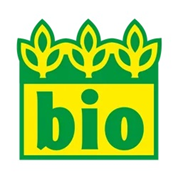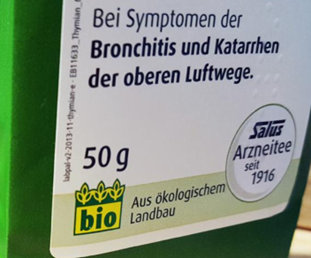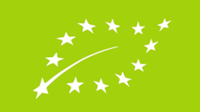Deception via a company’s organic logo despite organic quality? – SALUS
The case: SALUS, a German company committed to ecological progress and a natural/healthy way of life, produces and distributes natural medicines, food and nutritional supplements, including medicinal teas. In order to indicate the organic quality of its products, it has used the following organic logo in Germany, designed by the company, since 1999 (“bio” means “organic”):

The logo was created in-house. It was not awarded by an independent third party, but it appeared on the packaging without a clear and unambiguous indication that it was in fact a company’s own logo:

The Wettbewerbszentrale, an independent institution of the German economy, considered this market presence to be misleading. The logo had the appearance of a seal of quality. However, consumers expect quality seals to be awarded by independent third parties and to confirm compliance with specific criteria. This was lacking. A consumer would not be able to recognise that this was merely the company’s own logo.
However, SALUS did not agree with this argument. The logo, it said, was used as a trademark, even if it did not contain the company name. Consumers are used to trademarks of this kind and understand that the organic logo indicates the organic quality of SALUS products. And, incidentally, it argued, the company had been using the logo for this purpose since before the EU’s own organic logo came into existence.

However, the SALUS organic logo could not be regarded as a trademark. It obviously only refers to the organic properties of the teas, and not, as required by a trademark, also to the origin of the teas as being from SALUS.
In reality, the SALUS organic logo had the appearance of a seal of quality or an award, as indicated by its indivisible unity and size, as well as the image’s positioning as a separate element on the packaging. In addition, the three plants in the upper area resemble a crown-like coat of arms. With regard to the higher-quality organic products in question, consumers attach great importance to compliance with quality standards. Accordingly, quality seals are common in this field.
According to the case law of the German Federal Court of Justice, however, the consumer assumes from a quality seal that a neutral third party with the appropriate competence has tested the product bearing the seal for compliance with minimum requirements according to objective and meaningful criteria. The consumer therefore trusts that a product bearing the seal has specific characteristics considered essential for its quality and usefulness. The expectation of a certain quality associated with the seal is not normally limited to the time when the test was carried out. Rather, it is based on the continuation of the certified product’s properties. For this reason, continuous monitoring of the use of the quality seal by the awarding body is also required for such labels.
All this was missing from SALUS’s proprietary organic logo. SALUS had not explained when using the organic logo that it was only a company logo. Its market presence with this logo was therefore misleading and was banned as a result.
With regard to the medicinal teas, it then no longer mattered that the logo could have an advertising character; this judgment meant it was also illegal under the German Medicines Act.
Higher Regional Court of Munich, 9 December 2021, 6 U 1973/21.
Outlook. This decision has parallels with the legislative regulation for sustainability labels expected to come into force in 2026 due to the Green Claims Directive. In this context, on 22 March 2023, the Commission submitted to the European Parliament, among other things, the proposal to include the following commercial practice in the blacklist of the Directive concerning Unfair Business-to-Consumer Commercial Practices in the Internal Market:
The following commercial practice is considered unfair in all circumstances:
• Displaying a sustainability label which is not based on a certification scheme or not established by public authorities.
Learnings: If you want to use a label that attests to the organic quality of your products, the label must not give the impression of being a seal of quality awarded by an independent third party. If in doubt, use a certification mark. This was created by the European Union as a means of proof of the existence of certain characteristics of products and services by a neutral body.
Note: For the significance of the certification mark, also read the following BestCase:
Trademark protection for special quality? – Quality mark